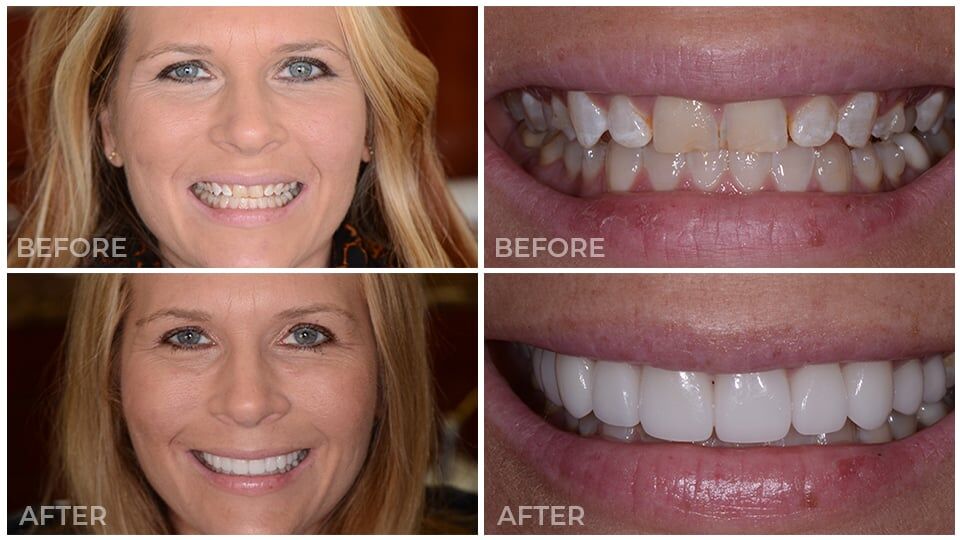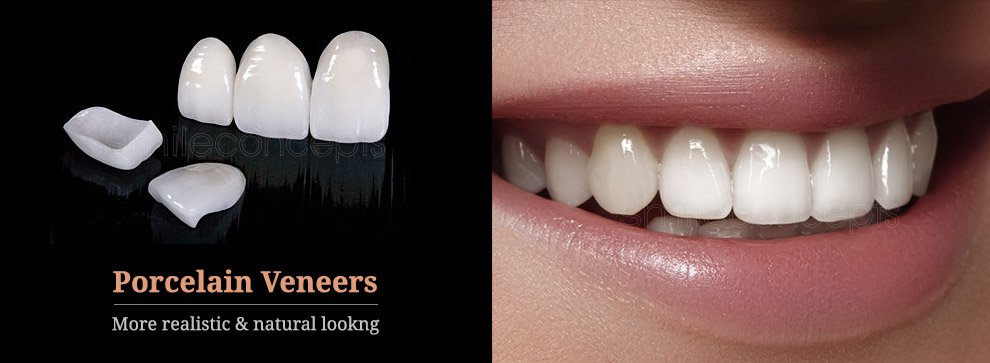Tips From Porcelain Veneers Dentist for a Seamless Procedure
The Total Introduction of Veneers: Types, Utilizes, and Their Effect on Your Smile
Veneers serve as a prominent solution for individuals looking for to improve their oral looks. These custom-crafted shells can efficiently mask blemishes such as staining and gaps. With 2 main kinds offered, porcelain and composite material, each deals distinct advantages and constraints. The influence of veneers extends past mere look, influencing self-confidence and social communications. Understanding their types and benefits is necessary. What might this mean for one's overall lifestyle?
Recognizing Veneers: What They Are and Just how They Function
Veneers are thin shells, commonly made from porcelain or composite resin, that are custom-crafted to fit over the front surface area of teeth. They offer both visual and functional purposes, offering a service for various dental imperfections such as discoloration, voids, and small imbalances. By sticking to the tooth enamel, veneers develop an all-natural look while boosting the form and color of the teeth.
The process typically includes a preliminary examination, where a dentist assesses the patient's requirements and talks about wanted end results - What Are Veneers. Following this, a minimal amount of enamel may be gotten rid of to fit the veneer. Perceptions of the teeth are after that taken to ensure an accurate fit. When fabricated, the veneers are bonded securely to the teeth utilizing a special oral adhesive. This treatment not only boosts the smile's appearance however also aids shield the underlying teeth from additional damage, making veneers a preferred option for numerous seeking a smile transformation
Kinds of Veneers: Porcelain vs. Compound Resin
The difference between porcelain and composite material veneers hinges on their material make-up and characteristics. Each type offers varying degrees of expense, long life, and toughness, affecting people' selections based upon their individual demands. Understanding these differences is necessary for making an educated choice pertaining to oral improvements.
Material Differences Explained
While both porcelain and composite material veneers offer the exact same cosmetic purpose, they vary substantially in material properties, longevity, and aesthetic outcomes. Porcelain veneers are crafted from a ceramic material that resembles the all-natural translucence of teeth, offering a realistic look. Their smooth surface area is immune to discoloration, making them an appealing option for those seeking a resilient visual. In comparison, composite material veneers are made from a tooth-colored plastic product, using versatility and ease of application. They may not achieve the same level of brightness or translucency as porcelain. In addition, composite veneers can be extra quickly shaped and repaired, making them an extra flexible choice in particular dental scenarios. Each type provides one-of-a-kind benefits customized to private preferences.
Long life and Toughness
Durability and longevity are substantial aspects when comparing porcelain and composite material veneers. Porcelain veneers are understood for their stamina, typically lasting 10 to 15 years with correct treatment. Their resilience versus damaging and tarnishing makes them a popular selection for individuals looking for long-lasting results. In comparison, composite material veneers usually have a shorter lifespan, balancing 5 to 7 years. While they can be repaired a lot more quickly if damaged, they are extra prone to wear and staining gradually. The choice in between these materials often depends upon the individual's way of life, visual objectives, and maintenance preferences. Inevitably, comprehending the distinctions in durability and resilience can lead clients in picking the veneer type that finest suits their requirements.
Cost Comparison Insights
Cost is an important factor to consider when selecting in between porcelain and composite material veneers. Porcelain veneers normally vary from $800 to $2,500 per tooth, mirroring their toughness, aesthetic appeal, and resistance to staining. These veneers call for an extra substantial treatment and specialized lab job, contributing to their greater cost tag. In comparison, composite resin veneers are typically extra budget friendly, setting you back between $250 and $1,500 per tooth. They can be used in a single browse through, which lowers labor expenses. However, composite veneers may need extra frequent substitutes, potentially boosting lasting expenses. Eventually, the choice between porcelain and composite resin veneers depends upon specific spending plans and wanted end results, stabilizing first prices versus long life and visual results.
The Benefits of Picking Veneers for Your Smile
Picking veneers supplies substantial advantages for those looking for a boosted smile. Their improved visual appeal can transform the appearance of teeth, while their stain-resistant buildings assure a long-term illumination - What Are Veneers. This mix makes veneers a preferred choice for people wanting to attain a remarkable smile
Enhanced Aesthetic Allure
Veneers typically emerge as a preferred solution due to their transformative visual benefits when individuals look for to boost their smiles. These thin shells, typically made from porcelain or composite material, can successfully hide blemishes such as chips, voids, and imbalance. By simulating the all-natural look of teeth, veneers provide a smooth, radiant smile. Their customizable nature allows for a customized method, enabling people to choose tones and shapes that ideal fit their facial features. Furthermore, veneers can create a consistent appearance, boosting overall face symmetry. This visual enhancement not only increases self-confidence but can also positively affect social interactions and individual relationships, making veneers a prominent choice for those wanting to attain a brighter, much more appealing smile.
Discolor Resistance Advantages
Veneers not only boost visual appeal however additionally use significant discolor resistance, making them an eye-catching option for people concerned regarding keeping a bright smile. Made up of resilient products such as porcelain or composite material, veneers are less porous than all-natural teeth, which aids prevent the absorption of spots from typical wrongdoers like coffee, tea, and red white wine. This integral stain resistance allows individuals to enjoy their preferred drinks without bothering with discoloration. Dental Veneers. In addition, the smooth surface area of veneers makes them easier to clean, further enhancing their longevity and maintaining their pristine appearance. Therefore, veneers give a sensible remedy for those seeking both appeal and performance in their oral care
The Process of Getting Veneers: What to Expect

Although the procedure of obtaining veneers might appear intimidating, comprehending the steps entailed can alleviate concerns. Initially, an assessment with a dental professional is required to identify if veneers are the proper service for the individual's dental problems. Throughout this visit, the dental professional will review preferred outcomes and take impacts of the teeth.
Next, a 2nd appointment is set up for tooth preparation, where a percentage of enamel is generally removed to accommodate the veneers. Temporary veneers might be placed while the personalized ones are crafted in a dental laboratory, which normally takes a number of weeks.
As soon as ready, the dental expert will put the veneers, guaranteeing proper fit and color before bonding them to the teeth making use of an unique adhesive. After final changes, the dental professional will certainly offer assistance on treatment. Comprehending these steps can aid individuals really feel extra comfortable and notified throughout the veneer procedure.
Maintenance and Care for Your Veneers
Keeping veneers needs regular like assure their longevity and appearance. Correct oral hygiene is necessary; cleaning twice daily with a non-abrasive tooth paste and flossing frequently aid avoid plaque buildup around the veneers. In addition, regular dental check-ups are crucial for checking the problem of the veneers and addressing any prospective problems early.
When attacking to prevent damages, people my latest blog post need to avoid hard foods and excessive force. It's likewise a good idea to limit usage of discoloring compounds, such as coffee, tea, and merlot, as these can impact the veneers' color in time.

Changing Your Smile: Real-Life Influence of Veneers
A glowing smile can significantly improve one's self-confidence and total look. For many individuals, veneers act as a transformative option, properly addressing various dental issues such as discoloration, spaces, and misalignment. These slim coverings, custom-made to fit over the front of the teeth, can create a harmonious and aesthetically pleasing smile.
Real-life cases illustrate the profound influence veneers can have. People usually report a prompt boost in self-confidence and social interactions following their procedure. The newly found self-confidence can cause more chances in personal and professional life, as people really feel even more inclined to engage and express themselves.
In addition, the emotional advantages prolong past mere look; lots of experience enhanced mental health as they accept their smiles. Consequently, veneers not just improve physical attributes yet additionally contribute significantly to total high quality of life, underscoring their worth in cosmetic dental care.
Often Asked Questions
The Length Of Time Do Veneers Generally Last Prior To Needing Substitute?
Veneers generally last in between 10 to 15 years before calling for replacement. Factors such as oral health, dental behaviors, and the sort of material used can influence their longevity and total durability. Regular oral check-ups are suggested.
Can Veneers Be Removed, and if So, Exactly how?
Yes, veneers can be additional info gotten rid of. A dental practitioner generally utilizes customized devices to thoroughly separate them from the teeth, making certain minimal damage to the underlying enamel, commonly adhered to by required modifications or restorations for optimal visual appeals.
Are Veneers Suitable for Everyone's Oral Problem?

Will Getting Veneers Pain or Require Anesthesia?
Obtaining veneers generally entails minimal pain, and many people receive regional anesthetic to guarantee a pain-free experience. Sensitivity might occur briefly later, yet most discover the process tolerable and are satisfied with the results.
How Do Veneers Affect Tooth Level Of Sensitivity After Positioning?
Veneers can briefly raise tooth sensitivity because of the elimination of enamel and the bonding process. The majority of people experience a decrease in level of sensitivity in time as the teeth readjust to the new veneers.
Veneers are slim shells, typically made from porcelain or composite you could try these out resin, that are custom-crafted to fit over the front surface area of teeth. Porcelain veneers are crafted from a ceramic material that simulates the natural translucence of teeth, offering a realistic look. Porcelain veneers usually vary from $800 to $2,500 per tooth, showing their resilience, aesthetic charm, and resistance to discoloration. In comparison, composite resin veneers are typically much more cost effective, setting you back between $250 and $1,500 per tooth. Made up of durable materials such as porcelain or composite resin, veneers are less permeable than natural teeth, which aids prevent the absorption of discolorations from common wrongdoers like coffee, tea, and red white wine.